Consulting Alumni Rankings 2023
Given the valuable skills they acquire and hone along the way, the alumni of consultancies account for a significant proportion of the senior ranks of businesses around the world. Those who make it to the top of large corporates — the focus of this report — can directly benefit their former employers, particularly in facilitating future business development, given their decision-making responsibilities and their connections to so many other corporate leaders. Building and nurturing powerful alumni networks can give organizations a crucial edge as they compete in increasingly competitive markets.
This concise report focuses on high-performing former consultants who now sit on the boards or comprise the leadership teams of companies in the Global 5001, Fortune 1000 or FTSE 350 indices. We first examine the sheer number of business leaders who are former consultants and measure the size of their networks to other senior leaders. The report’s main focus is to discover which consulting companies produce the greatest number of high-performing alumni. We also take a closer look at specific roles — chief executives (CEOs), chief financial officers (CFOs) and the newer chief technology (CTOs) and information officers (CTOs) — and investigate the gender differences of high-performing consulting alumni.
Using BoardEx’s unique and proprietary Global Leadership Database, this report offers unmatched insight into the alumni of consulting firms, making it an essential read for organizations looking to make the most of their alumni networks.
Key takeaways
- McKinsey has produced the highest number of current Fortune 1000 CEOs (at 40), but tech companies are much more prominent when it comes to producing CTOs and CIOs. IBM, Accenture and Oracle make the top four for both CTOs and CIOs. Given the variety of consulting firms and the range of skills consultants acquire while employed by them, there are differences in the types of roles their alumni move into.
- McKinsey & Company and the Big Four — PwC, KPMG, Deloitte and EY — all rank highly. Among consulting firms, these five firms have the highest number of alumni on the boards and leadership teams of Global 500, Fortune 1000 and FTSE 350 companies. A few other management consulting specialists make the top global rankings, including BCG and Bain; while Booz Allen Hamilton, Oliver Wyman (part of Marsh McLellan) and Kearney also appear in the Fortune 1000. Accenture and tech giants IBM and Microsoft house large consulting divisions and their alumni appear in the top 15 across all three rankings.
- More than a tenth of high-performing consulting alumni in US Fortune 1000 senior leadership roles worked at consulting firms outside the US. Among this group, the UK is the most common among these country offices after the US, followed by Canada, Ireland and France. At the higher end, almost half of EY’s high-performing alumni in senior Fortune 1000 roles worked at EY entities outside the US.
- Consulting alumni can be found in large numbers at the top of businesses around the world. At a global level, 17% of all Global 500 board and leadership team members have held at least one previous role at a consulting company. Former consultants have an even greater presence at the top of Fortune 1000 and FTSE 350 companies, accounting for 21% and 25% of board members and senior management respectively. Meanwhile, 16% of such high-performing alumni have worked at more than one consulting firm during their career.
To skip to a specific section of the report, select the section title below:
The value of consulting alumni
Through a strong alumni network, a company can drive business by leveraging its corporate ambassadors in their new places of work. Such contacts can be crucial. Firms that rely on referrals and warm introductions rather than cold calls when engaging with senior decision-makers at other companies will have a significant competitive advantage.
Smart firms have long recognized the value of maintaining strong relationships with influential and aspiring former employees, particularly with regard to developing future business (and, increasingly, recruiting returning alumni). Good personal contacts are vital in most professional environments — and critical in the consulting sector.
Yet to make the most of their former employees, consultancies must invest in creating and sustaining strong alumni networks, and the best of them will have standalone alumni programs and dedicated resources devoted to this cause.
Consulting firms have long recognized the value of maintaining strong relationships with former employees, particularly to facilitate future business development.
Moreover, with annual turnover in recent years trending around 12% for CEOs but far higher for other C-suite roles2, those running alumni programs need to ensure they have access to best-in-class data and other solutions to keep track of and mantain their relationships with alumni.
A skill set in demand among senior leadership
The consulting sector is a global industry with a wide range of industries and specialisms, such as strategy, operations, finance and technology. By working with clients on business-critical projects, those who succeed as consultants accumulate and/or strengthen a wide set of skills that are highly valued by senior leadership. These skills include analytical and commercial acumen, leadership qualities, the ability to collaborate with and present to different groups of people and to excel while feeling the pressure from a range of stakeholders.
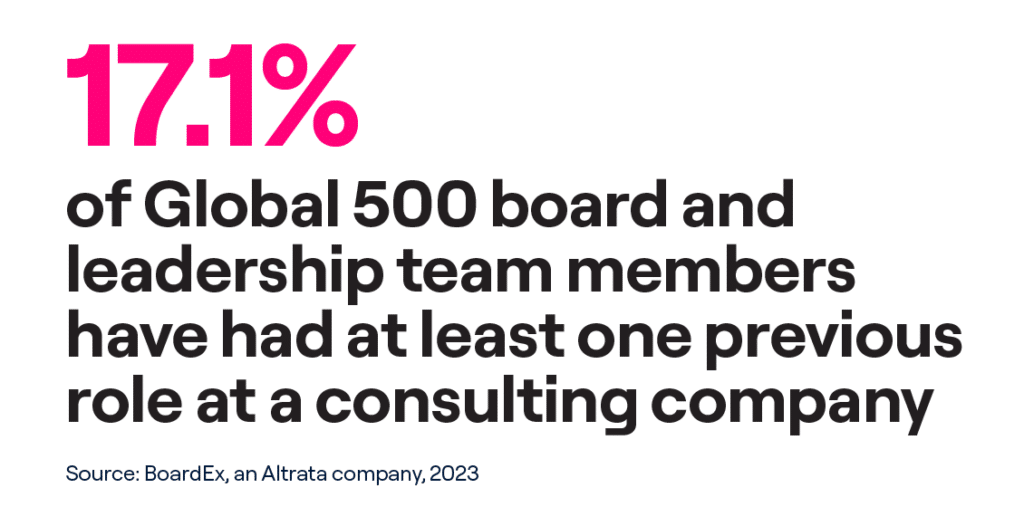
It’s no surprise, then, that consulting alumni make up a significant proportion of people at the top ranks of business around the world. At a global level, 17% of all Global 500 board and leadership team members have held at least one previous role at a consulting company. Among those at the top of Fortune 1000 and FTSE 350 companies, consulting alumni have an even greater presence, accounting for 21% and 25% respectively. Given that consultancies comprise only 1-2% of the companies in such indices3, these figures show just how much those with consulting experience are valued at the highest corporate levels.
Those with consulting experience are valued at the highest corporate levels.
These corporate leaders have had different paths of experience at consultancies but, for many, their consulting background forms a critical part of their career, with time spent per consultancy lasting eight to nine years on average. Interestingly, among the top eight management consultancies and professional services firms, ranked by the number of Fortune 1000 alumni4, almost a third of these individuals were either a partner or senior manager during their time at these firms. Other common roles included managing director, director, associate, principal, adviser and, of course, the many derivations of consultant.
Connections of high-performing former consultants
Consulting alumni forge a variety of career paths, some stay in consulting while others move into the corporate or public sectors. Those who make it to the top of large corporates — the focus of this rankings report — have responsibilities and decision-making abilities that make them crucially valuable to their alumni network(s) and, in turn, to these firms’ business opportunities.
In particular, these high-performing consulting alumni are hugely valuable through their relationships with other senior decision-makers. For example, the average former consultant sitting on the board or leadership team of a Fortune 1000 company has a direct connection to almost 75 other Fortune 1000 board or leadership team members. Among this group, Booz Allen Hamilton and Bain lead the way, with their high-performing alumni each having an average of more than 100 such connections. BCG’s high-performing alumni are also close to the top with an average of 99 such connections.
Booz Allen Hamilton’s and Bain’s high-performing alumni at Fortune 1000 companies each have an average of more than 100 direct connections to other Fortune 1000 board or leadership team members.
While this includes their current senior leadership team colleagues, the vast majority of their direct connections are key decision-makers across a sizeable number of very large companies. These connections have been made over the course of their professional careers, including their time at consulting companies and, depending upon the individual, their involvement in M&A deals. This ability to make warm connections to such a group is an additional asset.
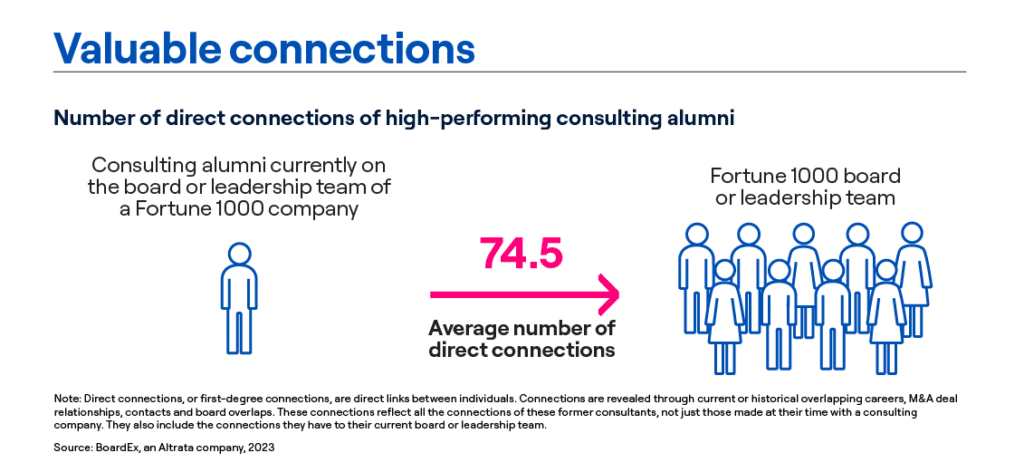
Given their sizable representation at the top ranks of business and their value to their former employers, in the next few sections we focus on identifying which consulting companies produce the greatest number of these high-performing alumni, and delve deeper at a role level and by gender.
Leadership rankings
When it comes to producing senior corporate leaders, not all consulting firms are created equal. Here we examine which consultancies have the most alumni who are currently either on the board or leadership team (C-suite) of the world’s largest companies by revenue5. To be sure, large consulting firms with global reach are more likely to come higher in the rankings than smaller consultancies operating in fewer markets. It is also important to note that some of these firms specialize in providing consulting services while, for others, consulting will be (an important) one of several revenue streams. For the sake of consistency, we include all alumni of an organization.
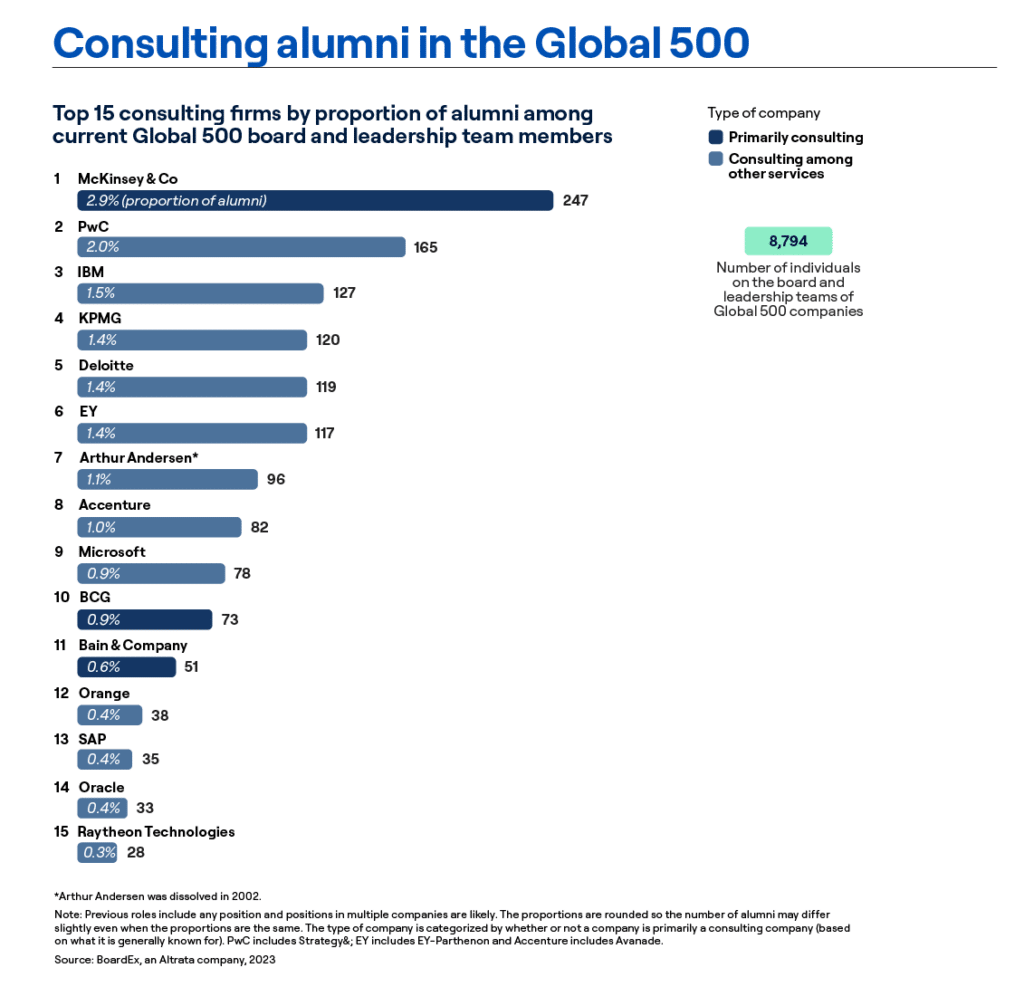
McKinsey & Co is the clear leader in a fragmented list. Accounting for 247 high-performing alumni, equating to almost 3% of Global 500 board and leadership team executives, management consultant specialist McKinsey & Co tops the alumni rankings, reflecting the stature, skills and networking opportunities a spell at McKinsey confers upon its alumni. Despite the sheer size and number of players in the consulting industry, the top 15 account for the vast majority of Global 500 board and leadership team consulting alumni.
Being a member of multiple consulting networks is relatively common among this set of alumni. While the vast majority of these high-performing alumni have previously worked at just one consulting firm, almost 14% have worked at two, and more than 2% have worked at three. Companies’ alumni teams tasked with engaging these former employees must, therefore, ensure their alumni programs are highly compelling.
More than 16% of high-performing alumni have previously worked at more than one consulting firm.
The Big Four and some large tech companies are highly placed in the rankings. With their global reach and provision of a wide range of professional services, the Big Four – PwC, KPMG, Deloitte and EY – all rank highly, each having previously employed more than 100 current board and leadership team executives. Tech giants IBM and Microsoft both house large consulting divisions, and their numbers of alumni rank in the top 10. Other tech companies, including Orange, SAP, Oracle and Raytheon Technologies, rank highly.
A few management consulting specialists make the top rankings. In addition to McKinsey, BCG and Bain also make the top 15, demonstrating the skills honed at these firms as well as the perceived value of experience gained from working at these respected organizations. Accenture, which offers both consulting and technology solutions, ranks eighth.
Consulting alumni in the US and UK
The rankings change when examining former consultants who go on to become senior corporate
leaders at US Fortune 1000 and UK FTSE 350 companies, yet some similar themes shine through.
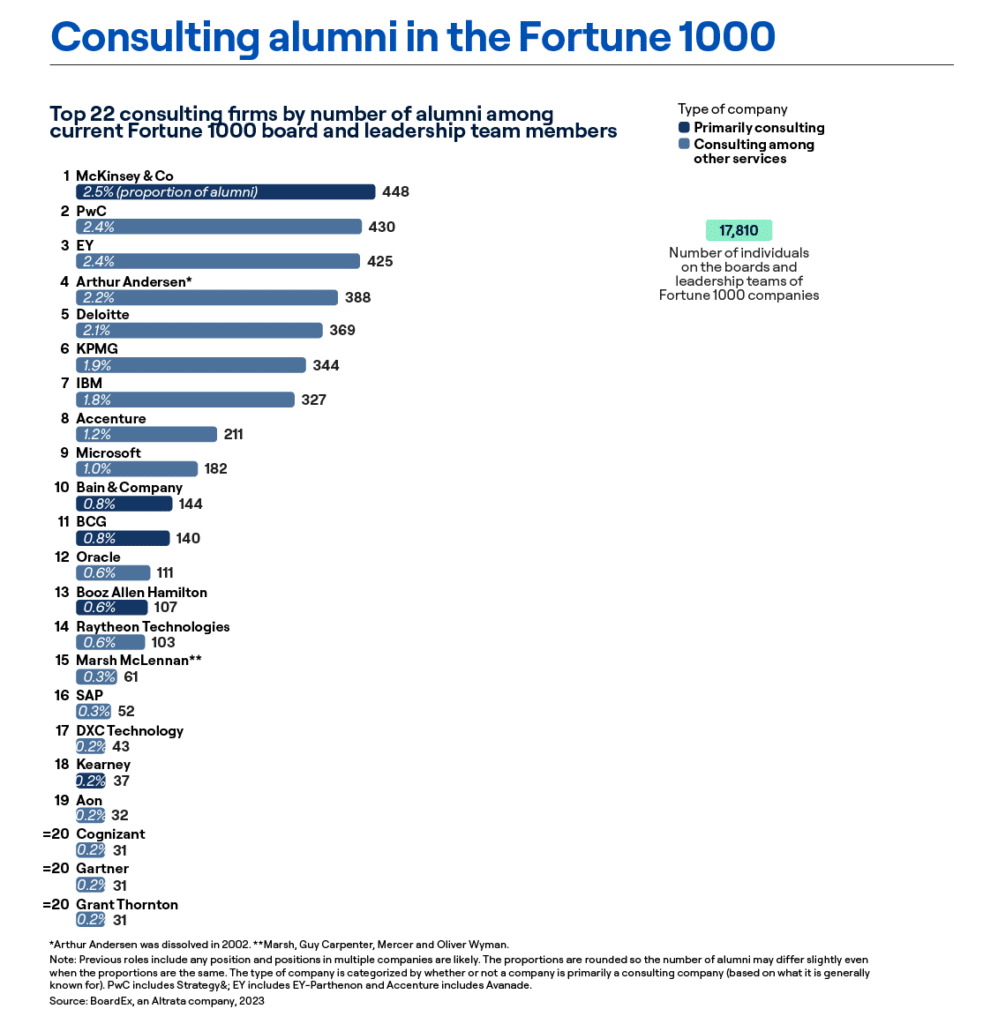
Among Fortune 1000 firms, McKinsey & Co leads again but only by a whisker, with 448 high-performing alumni. The Big Four have a slightly larger share of alumni in the Fortune 1000 than in the Global 500, at almost 9% of all senior leaders; with PwC and EY only slightly behind McKinsey & Co. Many of the same consultancies appear at the top of the Fortune 1000 rankings and the Global 500 thanks, largely, to the significant representation of US companies in the latter list (US firms comprise around a quarter of the list).
More than a tenth of alumni worked in consulting firms outside the US. Despite being senior leaders at US Fortune 1000 companies, not all are alumni of consulting entities based in the US. In fact, across the top-ranked 15, an average of almost 12% of these consulting firms’ high-performing alumni represent country offices outside the US. The UK is the most common among these country offices, followed by Canada, Ireland and France. For example, almost half of EY’s high-performing alumni at Fortune 1000 companies worked at EY entities outside the US, highlighting the need for alumni teams of large firms to consider alumni from other offices/countries in their programs.
There are slightly more firms solely focused on consulting in the Fortune 1000 alumni rankings. Along with management consultancies McKinsey, Bain and BCG, Booz Allen Hamilton and Oliver Wyman appear in the top 15 (Oliver Wyman is part of Marsh McLellan, which also includes Mercer in its stable of businesses).
Ranking third, almost half of EY’s 25 high-performing alumni at Fortune 1000 companies worked at EY entities based outside the US.
In the UK, the Big Four have a dominant position, with PwC coming out ahead with 214 high-performing alumni. McKinsey ranks fourth, with 115 (a 2.5% share of alumni). The top-ranked consulting firms in the UK account for a larger share of alumni, with PwC accounting for 4.6% of FTSE 350 corporate leaders. This is due, in part, to there being fewer companies in the FTSE 350 than the US and global rankings. Five companies — BAE Systems, QinetiQ, Kainos and BDO — only appear in the UK top 15.
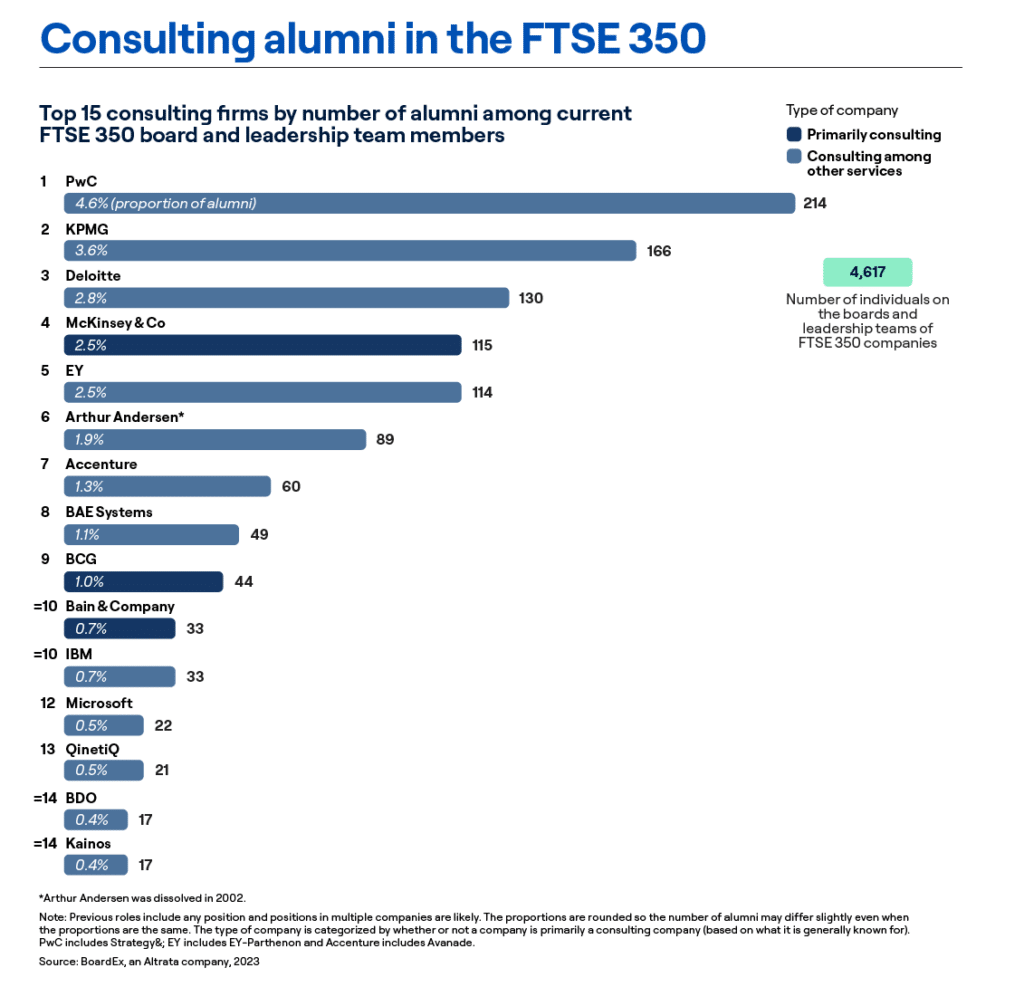
Rankings by role
Given the variety of consulting firms and the range of skills consultants acquire while employed
by them, there are differences in the types of roles their alumni tend to go into. Focusing on the
Fortune 1000, we reveal which consulting firms produce the most CEOs and CFOs, and also look
at two newer leadership roles — the CTO and CIO — that have become established in the C-suite
over the past decade or two.
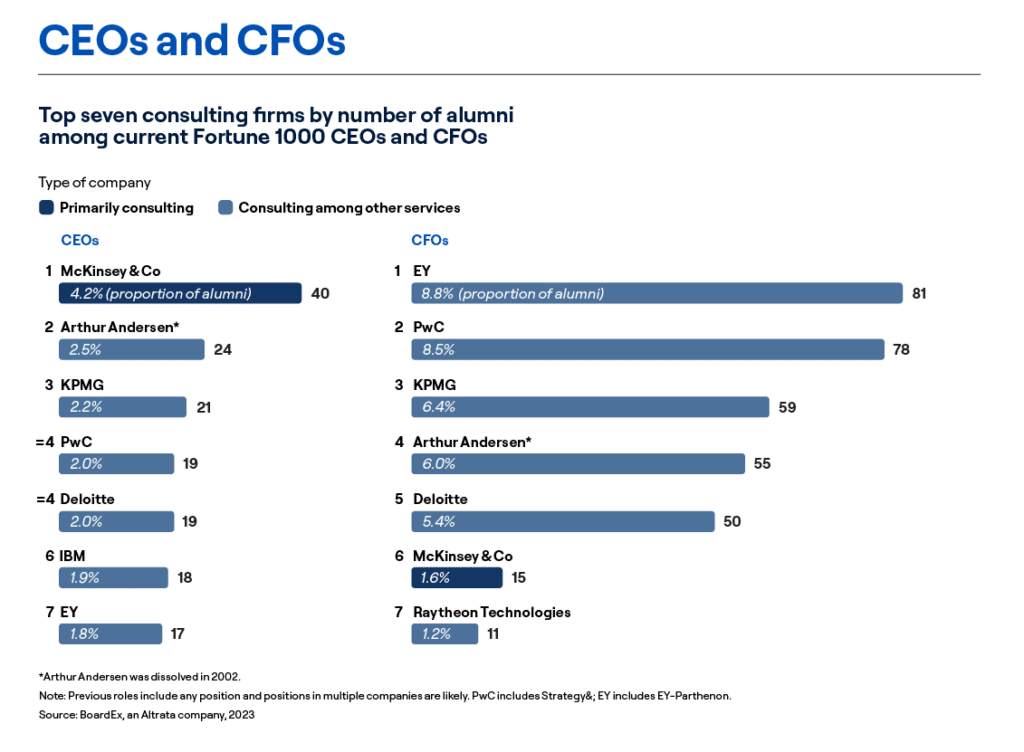
McKinsey leads the pack, having previously employed 40 current Fortune 1000 CEOs. This is a testament to the consultancy’s reach and also its established reputation for training future business leaders. The Big Four dominate the bulk of the remaining spots, though IBM alumni account for 18.
Tech companies with large consulting arms have produced the most CTOs and CIOs.
CFOs show a more concentrated selection of former employers, with EY and PwC accounting for over 17% of all alumni. Many leading CFOs at large companies have worked at the world’s largest professional-services firms earlier in their careers. This is a well-trodden route to gaining initial accountancy qualifications and accessing a wide range of finance-related roles in business services.
Tech companies are much more prominent when it comes to producing CTOs and CIOs. IBM,
Accenture and Oracle make the top four for both CTO and CIO alumni, clearly bestowing their
employees with the technological know-how that these two C-suite roles require. Still, PwC
ranks first among CIOs with 19 high-performing alumni (a share of over 5%), a reminder of the
variety of skillsets learned at professional services companies. The data shown features fewer
former employers because of the smaller sample size – not every Fortune 1000 company has a
technology or information leader in its C-suite.
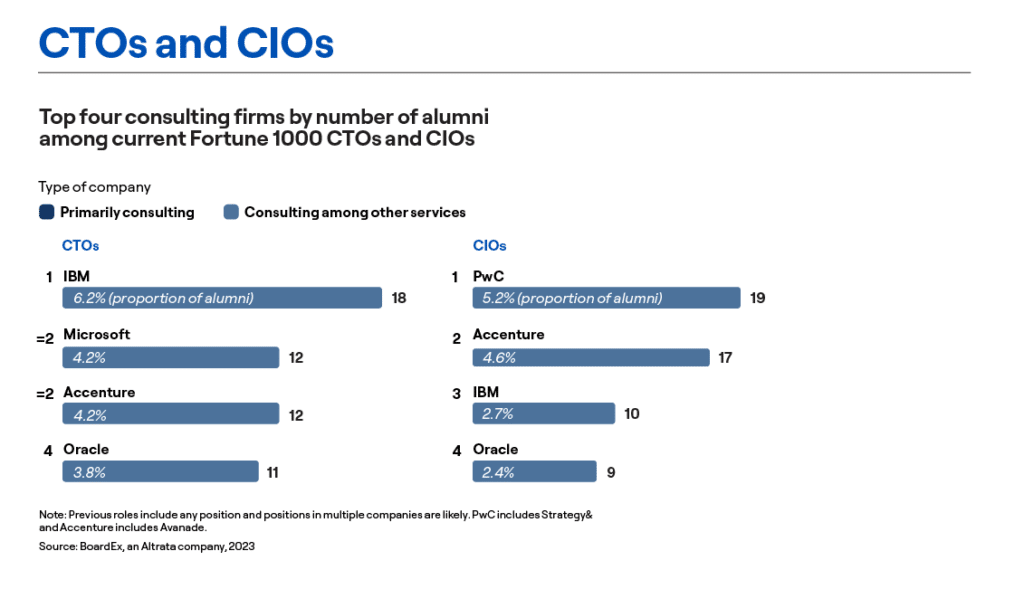
High-performing female alumni
How do high-performing female and male former consultants differ in their career trajectories? Here we examine female leaders by company and tenure.
Looking at the membership of Global 500 boards and leadership teams, women are more highly represented among consulting alumni than among executives from other professional backgrounds. Across the globe, women remain a minority in senior executive positions6. Yet among former consultants on Global 500 boards, women account for a 37% share compared with 25% among those who are not consulting alumni. This is also the case, to a lesser degree, on leadership teams, where women account for almost 28% of former consultants compared with 20% of all others.
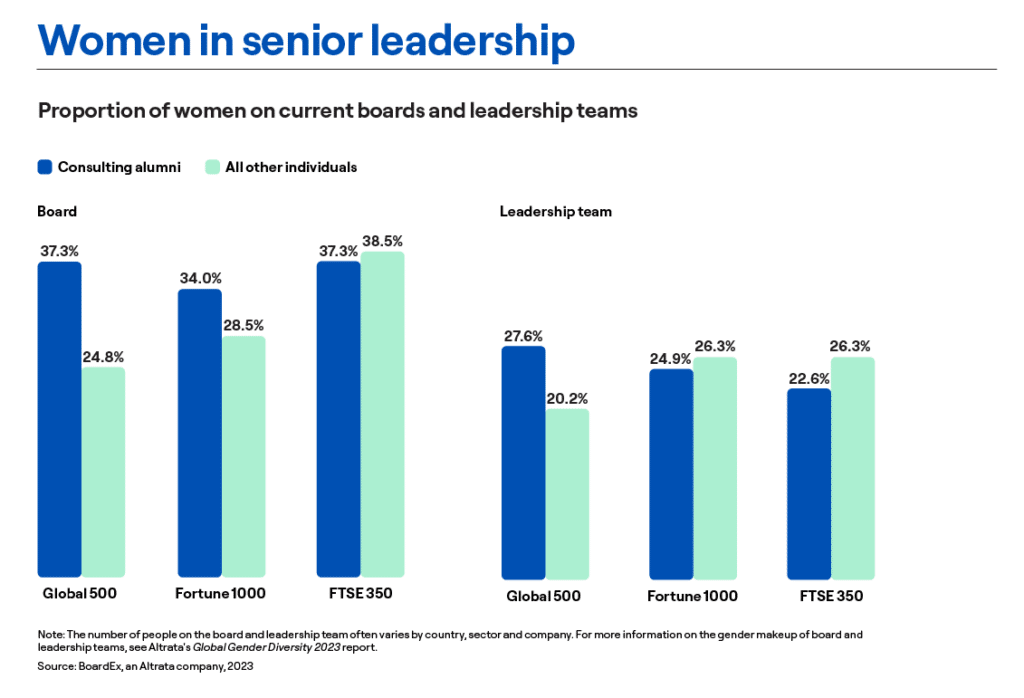
The gender difference is more mixed when it comes to the Fortune 1000, where women are more highly represented among consulting alumni on the board but not on the leadership team. On the boards and leadership teams of FTSE 350 firms, in contrast to the Global 500, the share of women among former consultants is lower than those from other professional backgrounds. These disparities are difficult to attribute to one specific reason, though consulting alumni tend to account for fewer (17%) individuals in leadership positions in the Global 500 but not to any significant degree.
Half of Microsoft’s high-performing alumni at Global 500 companies are women.
Some consulting organizations produce a higher share of female business leaders than others. Of those on the boards or leadership teams (taken together7 ) of Global 500 companies, Microsoft’s female share of high-performing alumni stands out at 50% while the figure is 40% for PwC and Aon8. share of high-performing female alumni. In the FTSE 350, Accenture’s and IBM’s alumni are 48% female, with Bain & Company following at 42%.
While acknowledging these higher female shares, it is worth stating that these are small numbers of individuals, who have accrued valuable experience and skills over many years, and should not be seen as a wider representation of these organizations and their approach to promoting female talent.
In matters of tenure and the number of roles held at their former consulting employers, there is little difference between men and women. These high-performing alumni tend to spend about the same length of time at a single consulting firm, averaging eight to nine years. They also hold a very similar number of roles during their stints at consulting companies. Female consulting alumni tend to take their first board or leadership position about a year later than their male counterparts. However, this trend also applies to executives without a consulting background, highlighting more general matters of gender at the top ranks of business.
Methodology
This rankings report was based on analysis from BoardEx, an Altrata company. This report leveraged BoardEx’s unique and proprietary Global Leadership Database, covering board and non-board members, C-suite executives, senior leaders and professional advisers. The database contains more than 2 million profiles of public, private and not-for-profit organizations and the 1.6 million people who work for them.
Our analysis centered on the individuals who make up the current boards and leadership teams at the corporations that comprise the Fortune Global 500, the Fortune 1000 and the FTSE 350. To delineate between consulting and non-consulting firms, we used Forbes’ World’s Best Management Consulting Firms, which lists approximately 230 consulting companies across four continents. To count as a consulting alum, an individual’s previous employment included a role at an organization on the Forbes list, regardless of role title or employment length. Some of these firms specialize mainly in providing consulting services while, for others, consulting will be one of several revenue streams. For the sake of consistency, we included all alumni of the organization. In total, our research encompassed 1,750 companies and approximately 31,000 individuals. The data used for analysis was extracted in May 2023.
While many subsidiaries of the parent consulting company were included, it is important to note our analysis was not based on an exhaustive list of subsidiaries across the Forbes list of consulting companies. We included subsidiaries using BoardEx data and also undertook manual verification using the parent company’s name for matching purposes.
All BoardEx data is collected from credible, published sources and cannot be edited by users. Our data is powered by a team of skilled analysts, who research, verify and maintain these profiles. Data details include current and historical roles (with start and end dates) for board positions, employment and education.
Common Terms Used
- Alumni network – A network of connections between individuals who share professional experience at a particular organization or who have studied at a particular educational institution. The focus is on the former.
- Connections – First-degree connections are direct links between individuals. Second-degree or indirect connections are made possible via the contacts belonging to those first-degree connections. Connections are revealed through merger and acquisition (M&A) deal relationships, current or historical overlapping careers, contacts and board overlaps.
- Consulting company/consultancy – A company that offers consulting services and, for the purposes of this report, is included in Forbes’ World’s Best Management Consulting Firms (a list of approximately 230 companies across four continents). While some of these firms specialize in providing consulting services, for others consulting will be one of several revenue streams. For the sake of consistency, we include all alumni of an organization.
- Leadership team – Corporate leadership teams are sometimes referred to as the C-suite, executive committees or management boards. They usually include executive directors – the most prominent being the CEO – as well as a corporation’s top layer of management. The leadership team includes executive chairs (but not non-executive chairs).
Maya Imberg is the Head of Thought Leadership and Analytics at Altrata. She is responsible for spearheading the company’s thought leadership efforts and overseeing its analytics and predictive modeling services commissioned by clients. She joined Wealth-X in 2016 as Director of Custom Research responsible for secondary research, data analytics and branded content. Maya has over fifteen years of experience in research, spanning market research, macroeconomics and financial services. Prior to joining Wealth-X, Maya held a variety of consultant and economist roles at the Economist Intelligence Unit and spent a number of years working for Datamonitor’s Financial Services practice. Maya holds an undergraduate and MSc degree in economics and comparative politics from the University of Pennsylvania and London School of Economics respectively.
About BoardEx
BoardEx is the leading provider of executive intelligence and relationship mapping solutions, working with premier organizations across the academic, corporate, executive search, private equity, legal, and financial and professional services industries. Founded in 1999, organizations trust BoardEx to identify, qualify and map connection paths to 2 million organizations and the 1.6 million people who lead them, to enhance business development strategy, talent management and alumni relations efforts, as well as conduct data-driven research and analysis.
